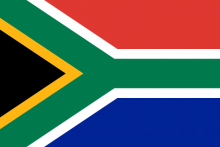
South Africa has, as far as I am aware, the most unique national anthem in the world. What makes it so unique, is the fact that it is in fact two different songs appended to each other. The first is Nkosi Sikele' iAfrika, which was the party song of the African National Congress (ANC): once a group designated a terrorist group by the Apartheid government, and currently the ruling party in South Africa. The second is The Call of South Africa (Die Stem van Suid-Afrika), which was the previous national anthem of South Africa. These are sung in five different languages (of the eleven official languages which South Africa has): Xhosa, Zulu, Sesotho, Afrikaans and English.
These attributes make the anthem a difficult one. Many people today—especially those who, like me, grew up with one foot in the previous (Apartheid) government—struggle with it, having never properly learned it. This is something which the local advertising industry has picked up on and is sometimes joked about. There has been a drive to educate people about the national anthem—there is even a website dedicated to learning it, as well as a fun phonetic version of it.
Despite all of this, I genuinely believe that the anthem is loved by most people and they cherish it. When it was made the national anthem, it reached out in reconciliation to the past, hoping to move together to a better future. One clue to the affection which the anthem engenders is the reaction which its abuse provokes. In 2009, before an international rugby game, Ras Dumasani (a South African reggae artist) performed a highly artistic rendition of the song, which was met with much ridicule. Last year a local artist named Ard Matthews (from the band Just Jinjer) forgot the words to the anthem and was severely criticised for that1. The public reaction which both of these incidents provoked leads me to believe that the public—despite their failings—do in fact treasure their national anthem.
So what is the point in me writing about the South African national anthem here? My concern is with the first half of the anthem—more specifically the original Nkosi Sikele' iAfrika as it was written by Enoch Sontonga in 1897. It is a song which captivates me more and more as time goes by. It was adopted as the anthem of the ANC in 1925 and either is or was affiliated with political movements in at least Zambia, Tanzania, Zimbabwe and Namibia. Nkosi Sikele' iAfrika means "God bless Africa". It has become a symbol for the struggle of freedom in Africa. It is humbling to think of the (original) freedom fighters—their hopes, dreams and desires—who adopted this particular song as their anthem; their creed.
But I fear that the meaning of this beautiful song could be lost in the political statements made around it; that South Africans would gloss over its true meaning as they routinely sing it. It is a deeply devotional song:
|
Nkosi, sikelel' iAfrika Maluphakamis'upondo lwayo Yizwa imithandazo yethu Nkosi sikelela, Thina lusapholwayo. Yehla Moya, Yehla Moya, |
Lord, bless Africa May her horn (glory) rise high up / be lifted high Hear Thou our prayers And bless us, Your children. Descend, O Spirit, |
If you sing this song, do you think about these words? Do you realise that you are asking God to bless this country, in spite of corrupt politicians and depraved criminals? And for Him to send His Holy Spirit, to a country which desperately needs it? How incredible!
This is a Struggle song. Not a political struggle, but the human struggle against our own sinful nature, addressed to our only hope for overcoming it.
Why are we not singing this song in our churches?
PS For anyone wondering, the South African national anthem (when sung properly) should sound like this.
- 1. Again this was something which the local advertising industry picked up on.







Comments
Disclaimer
I do think that Die Stem is also a beautiful song. It is hauntingly so. But it is a patriotic, not devotional. The only devotional stanza (the final one) was added years after the original poem was set to music, by request of the government (and was rarely sung anyway). Patriotism has its place, but only if you are first living by God's principals.
New Zealand's anthem is also
New Zealand's anthem is also a bi-lingual anthem, however it is the same song, just in two different languages...there are a few other national anthems which also consist of more than one language and/or set of verses
Did not know
Thank you for sharing, Anon! It is good to hear about other multicultural anthems.